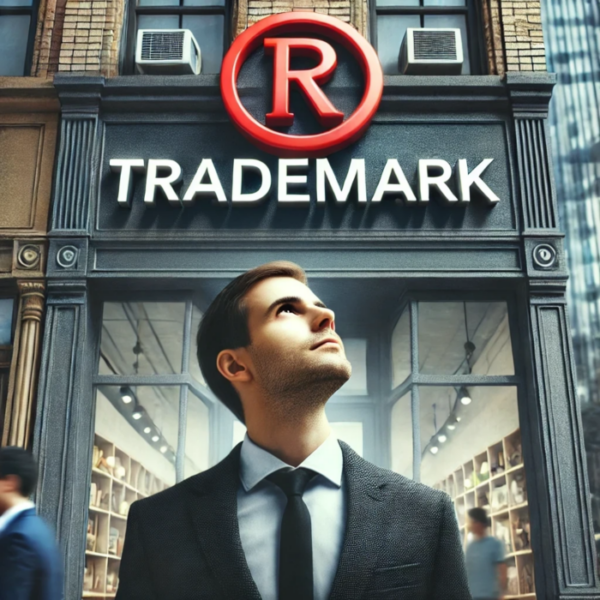
Business owners are often confused about the differences between trade names and trademarks. It is often assumed that establishing a trade name through a corporate registration or business license automatically grants trademark rights, but this is incorrect. While both terms relate to a business’s identity, they serve distinct legal and commercial purposes. A trade name is simply the official name under which a business operates, often registered with the state through the formation of a corporation, limited liability company, or other entity. However, it does not provide exclusive trademark rights. In contrast, a trademark offers legal protection for brand names, logos, and other identifiers associated with goods or services, preventing others from using confusingly similar marks. Understanding these differences is crucial for business owners looking to protect their brand and build a strong market presence. In this article, we’ll break down the key distinctions between trade names and trademarks and explain why properly registering both can enhance brand identity and legal security.
The Lanham Act (15 U.S.C. § 1127) provides statutory definitions of trade names and trademarks. A trade name or commercial name is any name used to identify a business or vocation, while a trademark is any word, name, symbol, or device, or any combination thereof used to identify goods or services provided or sold.
A trade name, also known as a ‘fictitious name’ or ‘assumed name,’ is the official name under which a company conducts business. This name is used to distinguish the business from others and serves as a form of branding. For instance, when you see a company operating under a unique name, that’s its trade name in action. However, while trade names aid in brand recognition, but they do not automatically confer exclusive rights or trademark protection. They must be used in commerce as a source identifier for goods or services to establish trademark rights.
It is the name a business uses in commerce, on signage, marketing materials, and other public-facing communications. However, unlike trademarks, a trade name filing, such as a business license does not grant exclusive rights or legal protection against others using a similar name. Trade names are typically registered at the state or local level as a requirement of doing business under local law. However, business licenses, corporate registrations, or registrations of business organizations alone do not prevent competitors from using the same or a similar name in another location or industry.
Many companies operate under trade names that differ from their formal legal entity names. Some well-known examples include:
A trade name creates a distinct company identity in the marketplace. Trademark rights can be established under a trade name when it is used as a source identifier on goods or services offered by the company. Trade names like Coca-Cola obviously carry trademark rights, as the name Coca-Cola is prominently featured on its beverages and is recognized the world over as the source of its beverages. In the case of Coca-Cola, the trade name carries widespread trademark rights.
Trade names are registered at the state or local level, often involving the completion of a ‘doing business as’ (DBA) form for a business entity to conduct business. This process typically includes a form submission, a fee, and sometimes a legal newspaper notice. Checking if the name is already in use can help avoid legal conflicts.
Filing a business license for a trade name is necessary, but does not grant exclusive rights or legal protection against others using it like a trademark registration.

A trademark is a name, logo, symbol, or slogan that offers legal protection for a company’s brand and aids in establishing brand recognition in the marketplace. Unlike trade names, trademarks are specifically identified with the goods or services provided by a company. For example, Nike’s swoosh symbol is a trademark that not only identifies the company but also is present on every pair of shoes that it sells. It has become symbol of the quality of the goods that is associated with the Nike company. The swoosh is a trademark. The trade name Nike also functions as a trademark because it is also on every pair of shoes Nike sells and indicates the quality and source of the shoes. The Nike name and the swoosh logo have also been registered as trademarks with the United States Patent and Trademark Office, establishing nationwide trademark rights.
Trade names can often be trademarked if they also serve as identifiers for the company’s goods or services. This dual functionality can enhance brand recognition and provide an extra layer of legal protection. Trade name registration can further solidify these benefits.
Trademarks provide legal protection by ensuring that only the trademark owner has the right to use the mark in commerce. This protection helps prevent others from using similar marks that could cause confusion among consumers. The process of establishing trademark rights involves trademark registration, which can be done at the state, federal, or international level. Registering a trademark with the United States Patent and Trademark Office (USPTO) provides the right to exclusive use of the mark and provides protection against infringement.
It is should be noted that a proper trademark search should be performed before adopting a trademark to ensure that it is not already in use. This step is essential to avoid potential legal disputes and to secure your brand’s identity in the marketplace. Thus, if you trade name will also serve as a trademark for your business, a trademark search should be performed before you adopt a business name and open your doors.
There are differences between trade names and trademarks. While both serve to establish a brand’s presence, they do so in different ways. Trade names are used for business operations but do not necessarily serve a branding function unless used as trademarks. In contrast, trademarks are used to identify the goods or services that the business offers in a manner that communicates the quality of the goods or services, informing the consumer on a general level of what they can expect from the goods or services..
One of the most significant differences lies in the rights carried by each. A trade name does not confer exclusive rights, meaning that multiple businesses can theoretically operate under the same trade name without necessarily infringing on each other’s rights. On the other hand, provide legal protection by granting exclusive rights to use the mark in commerce and preventing others from using confusingly similar marks for related goods or services. This distinction is crucial for businesses that want to protect their brand identity and avoid legal conflicts.
However, as noted earlier, a trade name can function as a trademark if it used as a trademark. Maintaining consistency between a trade name and a trademark can strengthen brand identity and recognition. When a business’s trade name and trademark align, it creates a cohesive brand image that is easily recognizable by consumers. This consistency not only enhances brand recognition but also builds consumer trust.
Tiffany & Co. v. Costco Wholesale Corp., 994 F. Supp. 2d 474 (S.D.N.Y. 2014) illustrates how a trade name can be used as a trademark. The court examined Costco’s unauthorized use of the name “Tiffany” to describe engagement rings that were not manufactured by Tiffany & Co. The case underscores the dual nature of Tiffany as both a trade name (identifying the company itself) and a trademark (protecting its exclusive brand identity in the jewelry market). Tiffany & Co.'s use of Tiffany both as a trade name and a trademark extended its brand protection beyond just company identification—it also grants exclusive rights in commerce. The misuse of “Tiffany” by Costco could mislead customers into believing they were purchasing authentic Tiffany-brand rings, thereby harming the brand’s reputation and leading to potential consumer confusion.
Both trade names and trademarks play essential roles in establishing a brand’s presence and ensuring legal protection.
Registering a trade name typically involves completing a Statement of Trade Name form at the state or local government level. In many states, a ‘doing business as’ (DBA) registration (e.g., a local business license) is necessary when a business operates under a name that is not its legal name. The DBA registration process usually requires a form submission, a fee, and sometimes a legal newspaper notice.
Before registering a trade name, businesses should check for potential conflicts to avoid legal disputes. However, state trade name registration does not guarantee exclusivity, as multiple businesses may register similar names in different industries or locations. A trade name must be unique from other registered names in the same jurisdiction; otherwise, registration will not be permitted. This step is crucial to ensure that your business operates under a distinct name, preventing any potential legal issues down the road.
The legal implications of using trade names versus trademarks are significant. Trade names do not offer legal protection on their own, meaning that a business cannot assume that it has exclusive rights simply based on the fact that it uses a trade name. Where the trade name is used in a trademark manner, such as prominently in association with its goods (e.g., on packaging), trademarks rights may be built in the trade name. The use of a trade name as a trademark can build common law trademark rights, providing the right to exclude others from use of a similar mark in the area where the trade name is in use. However, these trademark rights do not prevent third parties from registering similar marks. If a business uses its trade name as a trademark, it should consider registering the trade name as a trademark to establish registered trademark rights and enhance its legal protection, especially if the name identifies their products or services.
Choosing a trade name is a critical step in establishing your business’s identity. A thoughtfully selected name can be a valuable asset, contributing to your success in the marketplace. Conducting a trademark search to vet your proposed trade name and ensure it is not already in use is a prudent step. This due diligence can prevent future legal disputes and help you avoid weak brand and potential forced rebranding.
Once you have selected a trade name and trademark, you should proceed with registration both with the local or state government and with the USPTO. Conducting a thorough trademark search and promptly registering your trade name with the appropriate authorities, provides legal protection and exclusive rights before potential competitors or infringers have a chance to adopt the same or similar trade name.

Selection and vetting of a trade name can be challenging of the layperson. Consulting a trademark lawyer can ensure you are adopting a protectable and unique trade name. The lawyer can help you conduct thorough investigations to verify that your chosen trademark has not been previously registered.
A trademark lawyer can also guide you through the registration process, helping you understand the legal protections available for your trade name and educating you on proper use of your trade name. A trademark attorney can also clarify the distinctions between a legal business name, a trade name, and a trademark in your particular situation. Working with professionals helps avoid potential legal issues and secure your business’s brand identity.
In summary, understanding the differences between trade names and trademarks is crucial for protecting your business’s identity. While trade names help establish your business’s presence, trademarks provide legal protection for your brand. Both play essential roles in building a successful business.
By choosing a unique trade name, conducting proper clearance searches, using the trade name as a trademark, and registering your trade name as a trademark, you can secure a strong brand identity. Consulting with legal professionals can provide valuable insights and ensure compliance with all requirements. Protecting your brand is an investment in your business’s future success.
© 2025 Sierra IP Law. The information provided herein is not intended to be legal advice, but merely conveys general information that may be beneficial to the public, and should not be viewed as a substitute for legal consultation in a particular case.

"Mark and William are stellar in the capabilities, work ethic, character, knowledge, responsiveness, and quality of work. Hubby and I are incredibly grateful for them as they've done a phenomenal job working tirelessly over a time span of at least five years on a series of patents for hubby. Grateful that Fresno has such amazing patent attorneys! They're second to none and they never disappoint. Thank you, Mark, William, and your entire team!!"
Linda Guzman

Sierra IP Law, PC - Patents, Trademarks & Copyrights
FRESNO
7030 N. Fruit Ave.
Suite 110
Fresno, CA 93711
(559) 436-3800 | phone
BAKERSFIELD
1925 G. Street
Bakersfield, CA 93301
(661) 200-7724 | phone
SAN LUIS OBISPO
956 Walnut Street, 2nd Floor
San Luis Obispo, CA 93401
(805) 275-0943 | phone
SACRAMENTO
180 Promenade Circle, Suite 300
Sacramento, CA 95834
(916) 209-8525 | phone
MODESTO
1300 10th St., Suite F.
Modesto, CA 95345
(209) 286-0069 | phone
SANTA BARBARA
414 Olive Street
Santa Barbara, CA 93101
(805) 275-0943 | phone
SAN MATEO
1650 Borel Place, Suite 216
San Mateo, CA, CA 94402
(650) 398-1644. | phone
STOCKTON
110 N. San Joaquin St., 2nd Floor
Stockton, CA 95202
(209) 286-0069 | phone
PORTLAND
425 NW 10th Ave., Suite 200
Portland, OR 97209
(503) 343-9983 | phone
TACOMA
1201 Pacific Avenue, Suite 600
Tacoma, WA 98402
(253) 345-1545 | phone
KENNEWICK
1030 N Center Pkwy Suite N196
Kennewick, WA 99336
(509) 255-3442 | phone
2023 Sierra IP Law, PC - Patents, Trademarks & Copyrights - All Rights Reserved - Sitemap Privacy Lawyer Fresno, CA - Trademark Lawyer Modesto CA - Patent Lawyer Bakersfield, CA - Trademark Lawyer Bakersfield, CA - Patent Lawyer San Luis Obispo, CA - Trademark Lawyer San Luis Obispo, CA - Trademark Infringement Lawyer Tacoma WA - Internet Lawyer Bakersfield, CA - Trademark Lawyer Sacramento, CA - Patent Lawyer Sacramento, CA - Trademark Infringement Lawyer Sacrament CA - Patent Lawyer Tacoma WA - Intellectual Property Lawyer Tacoma WA - Trademark lawyer Tacoma WA - Portland Patent Attorney - Santa Barbara Patent Attorney - Santa Barbara Trademark Attorney